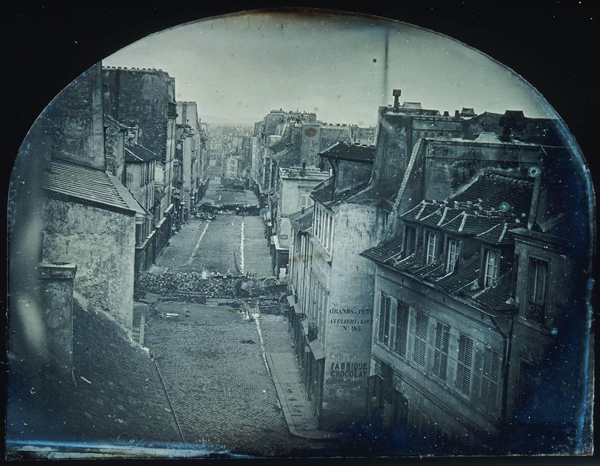An Attack on the Politics of the National Government
The selection below is from History of the Paris Commune of 1871, a book on the Paris Commune published by Henry Lissagaray in French in 1876 and translated into English by Eleanor Marx a decade later. Lissagaray was a journalist who fought on the side of the Communards on the barricades. Below he provides the Communards' perspective on the break down of relations between Paris and the national government.
The Prussians entered Paris on the 1st March. This Paris which the people had taken possession of was no longer the Paris of the nobles and the great bourgeoisie of 1815. Black flags hung from the houses, but the deserted streets, the closed shops, the dried-up fountains, the veiled statues of the Place de la Concorde, the gas not lighted at night, still more pregnantly announced a town in its agony. Prostitutes who ventured into the quarters of the enemy were publicly whipped. A café in the Champs-Elysées which had opened its doors to the victors was ransacked. There was but one grand seigneur in the Faubourg St. Germain to offer his house to the Prussians.
flags hung from the houses, but the deserted streets, the closed shops, the dried-up fountains, the veiled statues of the Place de la Concorde, the gas not lighted at night, still more pregnantly announced a town in its agony. Prostitutes who ventured into the quarters of the enemy were publicly whipped. A café in the Champs-Elysées which had opened its doors to the victors was ransacked. There was but one grand seigneur in the Faubourg St. Germain to offer his house to the Prussians.
Paris was still wincing under this affront, when a new avalanche of insults poured down upon her from Bordeaux. Not only had the Assembly not found a word or act to help her in this painful crisis, but its papers, the Journal Officiel at their head, were indignant that she should have thought of defending herself against the Prussians. A proposition was being signed in the bureaux to fix the seat of the Assembly outside of Paris. The projected law on overdue bills and house-rents opened the prospect of numberless failures. Peace had been accepted, hurriedly voted like an ordinary business. Alsace, the greater part of Lorraine, 1,600,000 Frenchmen torn from their fatherland, five milliards to pay, the forts to the east of Paris to be-occupied till the payment of the first 500,000,000 francs, and the departments of the East till the entire payment; this was what Trochu, Favre, and the coalition cost us, the price for which Bismarck permitted us the Chambre introuvable. And to console Paris for so much disgrace, M. Thiers appointed as General of the National Guard the incapable and brutal commander of the first army of the Loire, D'Aurelles de Paladines. Two senators, Vinoy and D'Aurelles, two Bonapartists, at the head of Republican Paris — this was too much. All Paris had the presentiment of a coup-d'éitat . [70]
That evening there were large groups gathered in the boulevards. The National Guards, refusing to acknowledge D'Aurelles as their commander, proposed the appointment of Garibaldi. On the 3rd two hundred battalions sent their delegates to Vauxhall. Matters began with the reading of the statutes. The preamble declared the Republic ‘the only Government by law and justice superior to universal suffrage, which is its offspring.' ‘The delegates,' said Article 6, ‘must prevent every attempt whose object would be the overthrow of the Republic.' The Central Committee was composed of three delegates for each arrondissement, elected by the companies, battalions, legions and of the chefs-de-légion . [71] While awaiting the regular election, the meeting there and then named a provisional executive committee. Varlin, Pindy, Jacques Durand, and some other Socialists of the Corderie formed part of it, an understanding having been come to between the Central Committee, or rather the commission which had drawn up the statutes, and the three groups of the Corderie. Varlin carried a unanimous vote on the immediate re-election of the officers of the National Guard. Another motion was put: ‘That the department of the Seine constitute itself an independent republic in case of the Assembly attempting to decapitalize Paris,' — a motion unsound in its conception, faultily drawn up, which seemed to isolate Paris from the rest of France — an anti-revolutionist, anti-Parisian idea, cruelly exploited against the Commune. Who then was to feed Paris if not the provinces? Who was to save our peasants if not Paris? But Paris had been confined to solitary life for six months; she alone to the last moment had declared for the continuation of the struggle at any price, alone affirmed the Republic by a vote. Her abandonment, the vote of the provinces, the rural majority, made so many men ready to die for the universal republic, fancy that the Republic might be shut up within Paris.